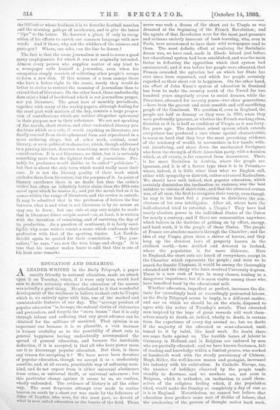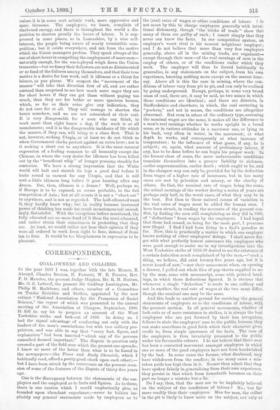EDUCATION AND DRELMENTG.
ALEADER-WRITER in the Daily Telegraph, a paper usually friendly to national education, made an attack upon it on Tuesday, which, if it were only true, would lead men to doubt seriously whether the education of the masses was actually a good thing. Tie attributed to it that wonderful development of the readiness to believe in short cuts to Utopia which is, we entirely agree with him, one of the marked and unmistakable features of our day. The " average product of popular education "is, he says, the natural victim of visionaries and pretenders, and forgets the "stern lesson" that it is only through labour and suffering that any great advance can be obtained for the millions of mankind. That opinion is an important one because it is so plausible, a vast increase in human credulity as to the possibility of short cuts to general happiness having undoubtedly accompanied the spread of general education, and because the inevitable deduction, if it is accepted, is that all who have power must use it to discourage popular education. But then, is there any reason for accepting it ? We have never been devotees of popular education, though we accept it as a moderately sensible, and, at all events, practicable way of softening man- kind, and do not expect from it either universal abstinence from crime, or universal thrift, or universal soberness ; but this particular charge against it seems to us, we confess, wholly unfounded. The evidence of history is all the other way. The most desperate attempt ever made to realise heaven on earth by a short cut was made by the followers of John of Leyden, who were, for the most part, as devoid of what is now called education as the beasts of the field. There
never was such a dream of the short cut to Utopia as was dreamed at the beginning of the French Revolution; and the agents of that Revolution were for the most part peasants and artisans entirely innocent of book-learning, who, even in Paris, were accustomed to have their wild newspapers read to them. The most definite effort at realising the Socialistic dream was, we have read, made in Rhode Island just before her educational system had been established, and was the main factor in defeating the opposition which that system had encountered; and it was before her people were educated, that Prussia conceded the agrarian law on which her State has ever since been organised, and which her people certainly regarded as their short cut to happiness. On the other hand, the effect of John Knox's system of education in Scotland has been to make the country north of the Tweed for two hundred years singularly averse to social dreams, while the Prussians, educated for seventy years—two clear generations —have been the gravest and most sensible and self-sacrificing people of the Continent. We question if, even in England, the people are half as dreamy as they were in 1830, when they were profoundly ignorant, or whether the French working class, Socialist as it is, is half as confident of Utopia as it was forty- five years ago. The American school system which extends everywhere has produced a race whose special characteristic is sense so hard that they hear the most provoking evidence of the tendency of wealth to accumulate in few hands, with- out interfering, and shoot down the uneducated foreigners who form the strength of their Anarchist party, with a decision which, at all events, is far removed from dreaminess. There is far more Socialism in Austria, where the people are ignorant, and it is of a fiercer type than it is in Prussia,— where, indeed, it is little other than what we English call, either with sympathy or distrust, rather advanced Radicalism. We should have said, indeed, that popular education, which certainly diminishes the inclination to violence, was the best antidote to visions of short cats; and that the educated artisan was, of all men, the first to recognise their vanity, even though he may in his heart feel a yearning to disbelieve the eon- elusions .of his own intelligence. After all, where have the half-educated tried to establish a. Utopia? They have had nearly absolute power in the individual States of the Union for nearly a century; and if there are communities anywhere which believe in the doctrine of getting on by effort, energy, and hard work, it is the people of those States. The people of France are absolute masters through the Chamber; and the idea of any Utopia gives them a shiver of horror, and they keep up the strictest laws of property known in the civilised world,—laws derided and detested in Ireland, where the population is far more illiterate. Here in England, the short cuts are heard of everywhere, except in the Chamber which represents the people ; and were we to search for fanatic Utopians, it would be among the thoroughly educated and the clergy who have received University degrees. There is a new rush of hope in many classes, leading to a, dangerous impatience, but it is most visible among those who have benefited least by the educational mill.
Whether education, imperfect or perfect, increases the dis- taste for exceedingly hard or exceedingly protracted labour, as the Daily Telegraph seems to imply, is a different matter, and one on which we should be, on the whole, disposed to. agree with the writer of Tuesday's article. That educated men inspired by the hope of great rewards will work them- selves nearly to death, or, indeed, wholly to death, is certain from the experience of every day around us ; but we doubt if the majority of the educated or semi-educated, until tamed to it by habit, like bard work. No doubt there• are some facts against us. The terrible hours of labour in Germany, in Holland, and in Belgium are endured by men who are partially educated ; and we have known Scotsmen, full of reading and knowledge within a limited groove, who worked at handicraft work with the steady persistency of Chinese. Hugh Miller, the well-known mason and geologist, increased his industry with his cultivation. In Catholic Europe, too, the number of holidays observed by the people tends steadily to decrease, and we nowhere see, not even in Belgium, which is orthodox, an inclination to avail them- selves of the religious feeling which, if the population liked, would make the Sunday as completely a day of rest as- it is in England. Nevertheless, we cannot but believe that education does produce some sort of dislike of labour, that the awakening of the powers of thought makes hard work, unless it is in some sort artistic work, more oppressive and more tiresome. The employers, we know, complain of als.nkened energy, and there is throughout the world a dis- position to shorten greatly the hours of labour. It is sup- pressed in some places, as in Lancashire, by a wise self- interest, the people being aware of nearly irresistible com- petition; but it exists everywhere, and not from the motive which the Union managers profess. They speak always of the use of short hours in compelling the employment of more men— naturally enough, for the unemployed weigh down the Union treasuries—but wefancy their followers are not so disinterested or so fond of the failures among themselves, and that their true motive is a desire for less work, call it idleness or a thirst for leisure, as you please. We suspect the "movement of the masses" will take that direction first of all, and are rather amused than surprised to see how much more eager they are for short hours if they can get them without paying too much, than they are for better or more spacious houses, which, so far as their votes give any indication, they do not care for at all. They will manage to shorten the hours somehow, and we are not astonished at their zeal. It is very disagreeable for a man who can think, to work more than eight hours a day, if the work is at all monotonous; and it is the disagreeable incidents of life which the masses, if they can, will bring to a close first. That is not, however, seeking Utopia, or at least we do not think so when Government clerks protest against an extra hour; nor is it seeking a short cut to anywhere. It is the most natural expression of a feeling common to all humanity except the Chinese, in whom the very desire for idleness has been killed out by the "beneficent whip" of hunger pressing steadily for centuries. We have a strong impression that the White world will halt and stretch its legs a good deal before it looks round in earnest for any Utopia, and that it will seek a little idleness long before it goes hunting after any dream. But, then, idleness is a dream P Well, perhaps so, if Europe is to be exposed, as seems probable, to the full competition of Asia ; but at all events it is not a " short cut " to anywhere, and is not so regarded. The half-educated want it, they hardly know why ; but in reality because increased power of thinking has made too much monotonous toil exceed- ingly distasteful. With the exceptions before mentioned, the fully educated are no more fond of it than the semi-educated, and rather strain their consciences in protesting that they are. At least, we would rather not hear their opinion if they were all ordered to work from eight to four, instead of from ten to four. It would be too blasphemous in expression to be pleasant.



















































 Previous page
Previous page